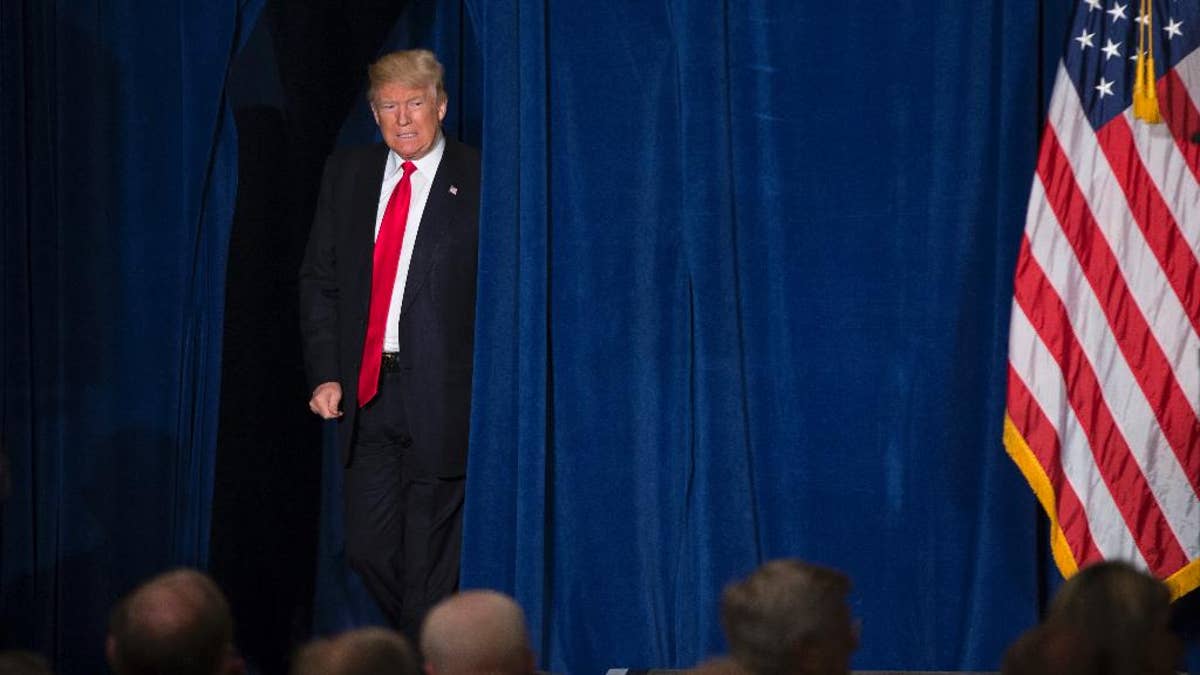
April 27, 2016: Republican presidential candidate Donald Trump arrives to give a foreign policy speech at the Mayflower Hotel in Washington. (The Associated Press)
In a speech Wednesday outlining his would-be foreign policy, Donald Trump tried to sound presidential. The Republican presidential candidate succeeded in sounding tough if contradictory. But he outlined a foreign policy that isn’t so different from that of Hillary Clinton.
Take ISIS for example. Trump acknowledged in his speech the jihadist army that is slipping its tentacles into the West and promised that its “days are numbered.” But Trump refused to provide any details of how he would fight ISIS—implying he doesn’t want to telegraph his brilliant strategy to the enemy.
This is too clever by half. Given that ISIS is rampaging in the Middle East and has massacred Americans there, in Europe, and right here in the United States, it’s insufficient for a presidential candidate effectively to say “yadda, yadda I’ll beat ISIS” and provide no more information.
Frankly, it sounds like a teenager who has failed every quiz during the semester but implausibly promises to save the day by acing the final.
Trump’s strategy to defeat ISIS is basically the same as that of President Obama and Secretary Clinton, which is to say he has no strategy at all.
The reality is Trump’s strategy to defeat ISIS is basically the same as that of President Obama and Secretary Clinton, which is to say he has no strategy at all.
Earlier Wednesday Trump all but endorsed Obama’s announcement that he’ll send 250 more troops to Syria, saying “I could agree with it,” but declaring he would dispatch them secretly.
Trump doesn’t know how to go beyond the Obama-Clinton foreign policy of using gestures to appear be reacting to events without actually solving anything.
Evidently, Trump would also mirror Clinton on Russia. Despite promises to regard Moscow “with open eyes” Trump observed Wednesday, “we are not bound to be adversaries,” and added, “I believe an easing of tensions and improved relations with Russia.”
This is no different than the self-regard and conceit that led Clinton to offer the Russians a plastic “reset” button, believing the force of her personality would change the Russians’ calculation of their national interests.
Wednesday in Washington Trump laudably called for containing the spread of radical Islam while observing that is not just a military struggle but a “philosophical contest”—a reality that has eluded much of the U.S. government since 9/11.
It seems like Trump is newly willing to borrow a few ideas from Ted Cruz and other conservatives who have been pressing these issues throughout the presidential campaign. However, the businessman undercut himself by saying he will stick with the Iran nuclear deal he allegedly disdains, promising merely to implement it strictly.
There is no way to defeat radical Islam without ceasing the grand accommodation of the Iranian regime that Obama enacted as Secretary Clinton cheered.
The biggest takeaway from Trump’s foreign policy speech should be that the only remaining candidate with a conservative, Reaganesque foreign policy prepared for today’s threats is Ted Cruz.
Trump’s speech was helpful for that reason alone.
